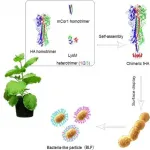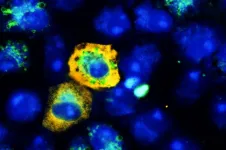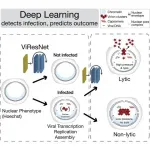Investigational Alzheimer's drug improves biomarkers of the disease
International clinical trial yields mixed results with unclear cognitive effects but promising biomarker results
2021-06-21
(Press-News.org) An investigational Alzheimer's drug reduced molecular markers of disease and curbed neurodegeneration in the brain, without demonstrating evidence of cognitive benefit, in a phase 2/3 clinical trial led by researchers at Washington University School of Medicine in St. Louis through its Dominantly Inherited Alzheimer Network-Trials Unit (DIAN-TU). These results led the trial leaders to offer the drug, known as gantenerumab, to participants as part of an exploratory open-label extension. The researchers continue to monitor changes in measures of Alzheimer's disease in those participants who are receiving the drug.
The DIAN-TU study (ClinicalTrials.gov Identifier: NCT01760005), published June 21 in Nature Medicine, evaluated the effects of two investigational drugs - gantenerumab, made by Roche and its U.S. affiliate, Genentech, and solanezumab, made by Eli Lilly and Co. - in people with a rare, inherited, early-onset form of Alzheimer's known as dominantly inherited Alzheimer's disease or autosomal dominant Alzheimer's disease. Such people are born with a mutation that causes Alzheimer's, and experience declines in memory and thinking skills starting as early as their 30s or 40s.
"Gantenerumab had a major impact on Alzheimer's biomarkers," said principal investigator Randall J. Bateman, MD, director of DIAN-TU and the Charles F. and Joanne Knight Distinguished Professor of Neurology at Washington University. "The drug's ability to shift multiple Alzheimer's biomarkers toward normal indicates that it is positively affecting the disease process. The effect was strong enough that we launched an open-label extension of the trial so participants have the opportunity to stay on the drug as we continue to study it."
Over the past few decades, scientists have pieced together the changes that occur as Alzheimer's develops, a process that takes 20 years or more. First, the protein amyloid beta starts forming plaques in the brain. Later, levels of tau and neurofilament light chain rise in the cerebrospinal fluid that surrounds the brain and spinal cord, and the brain begins to shrink. Then, tangles of tau protein form in the brain. Only then do people with the disease start exhibiting signs of memory loss and confusion.
In this study, 52 patients were randomized to gantenerumab, which led to a reduction in the amount of amyloid plaques in the brain, and lowered soluble tau and phospho-tau, and slowed the rise of neurofilament light chain levels in the cerebrospinal fluid. Neurofilament light chain is a marker that reflects neurodegeneration. Overall, gantenerumab's safety profile in this trial was consistent with that from other clinical trials of the investigational medicine, and no new safety issues were identified.
The primary endpoint of the DIAN-TU study was the prevention or slowing of cognitive decline in people who are nearly certain to develop Alzheimer's due to genetic mutations. Neither drug met the primary endpoint, although the study wasn't able to determine effects on thinking and memory in participants who entered the study without symptoms, because they exhibited little to no decline in cognitive function. The study also was unable to assess the effects of higher doses of the drugs, which were escalated to the desired levels late in the trial after a protocol amendment. Participants who received gantenerumab started on a low dose and only started ramping up to a fivefold higher target dose about halfway through the trial, prompted by observations from other studies of gantenerumab.
However, as a secondary endpoint, the study also evaluated the effect of the drugs on molecular and cellular signs of Alzheimer's disease. On these measures, gantenerumab showed potential benefit.
"These biomarker results suggest that gantenerumab had a favorable impact on the target and downstream markers of Dominantly Inherited Alzheimer's Disease," said Rachelle Doody, MD, PhD, global head of neurodegeneration at Roche and Genentech. "We support the continued scientific investigation of gantenerumab in Washington University's exploratory, open-label extension study to build on learnings from DIAN-TU-001, and are grateful to be a part of this close collaboration between industry, academia and patients as we continue to tackle the complex challenge of Alzheimer's disease. We are encouraged by the advancements being made and look forward to continued progress for people with Alzheimer's disease."
This trial followed 144 participants for up to seven years; the average follow-up was about five years. All participants carry a genetic mutation that causes a form of Alzheimer's dementia at early ages. The researchers recruited participants who were expected to develop symptoms within 15 years or who already had very mild symptoms of memory loss and cognitive decline at the trial's outset. In most cases, their brains already showed early signs of disease. Participants were randomly assigned to receive solanezumab, gantenerumab or a placebo.
"Although the trial focuses on people with rare mutations, drugs that are successful in this population would be promising candidates for preventing or treating the forms of Alzheimer's that occur more commonly in older adults. The destructive molecular and cellular processes in the brain are similar in both types of the disease," Bateman said.
INFORMATION:
[Attachments] See images for this press release:

ELSE PRESS RELEASES FROM THIS DATE:
2021-06-21
In the mid-2030s, multiple United States coastal regions may see rapid increases in the number of high-tide flooding (HTF) days, according to a study led by the University of Hawai'i at Mānoa and published today in Nature Climate Change. The combined effects of sea-level rise (SLR) and natural fluctuations in tidal range are anticipated to cause tipping points in the frequency of HTF.
Coastal locations around the U.S., particularly along the Atlantic coast, are experiencing recurrent flooding at high tide. The impact of HTF accumulates over numerous seemingly minor occurrences, which can exceed the impact of rare extremes over time. These impacts are subtle--for example, the loss of revenue due to recurrent road and business closures--compared with the physical damage of property ...
2021-06-21
Scientists studying a common childhood cancer have made a major breakthrough which could lead to a cure for some youngsters who would not have survived the condition.
An international study, involving Newcastle University, UK, has for the first time found a genetic marker in tumours from patients with high-risk neuroblastoma.
Research, published in the Journal of Clinical Oncology, has identified that alterations in the neuroblastoma's ALK (anaplastic lymphoma kinase) gene are associated with a significantly poorer prognosis for children with high-risk disease.
Experts ...
2021-06-21
Drugs routinely used during fertility treatments to release eggs do not increase the risk of developing breast cancer, new research has shown.
Researchers from King's College London, in partnership with King's Fertility, analysed studies involving 1.8 million women undergoing fertility treatments. These women were followed up in studies for an average period of 27 years and had no increase in the risk of developing breast cancer.
The research, published today in Fertility and Sterility journal, is the largest study to date assessing whether commonly used fertility drugs are for a cancer risk for women.
Fertility treatments can range from using medications to boost the release of an egg in a women's natural cycle to more complex ...
2021-06-21
A study by the University of Liverpool has shown that while asymptomatic COVID-19 testing in Liverpool was popular, significant inequalities were evident between those who got tested and those who didn't.
Published in the journal The Lancet Regional Health - Europe, the study found that 43% of residents aged over 5 years (n = 214 525) took up the offer of free testing for people without symptoms of COVID-19 between 6th November 2020 and 31st January 2021. A total of 1.3% of tests were positive, meaning that 5192 individuals who did not know they had the virus were notified ...
2021-06-21
The avian influenza, an acute viral infectious disease that occurs in poultry such as chickens, ducks, and migratory birds, has been reported to be transmittable to humans. It is difficult to control because it spreads among migratory birds that travel to China, Europe, and elsewhere. Once it is transmitted, it spreads rapidly. Disposing infected livestock is not only costly, but also a cause of serious environmental pollution. This is why vaccines against infectious diseases are imperative. To this, a research team in Korea has recently developed a plant-based, adjuvant-free, recombinant protein vaccine that exhibits a strong immune response.
Professor ...
2021-06-21
Researchers from the German Center for Infection Research (DZIF) at Charité - Universitätsmedizin Berlin and the University of Bonn have examined the way in which SARS-CoV-2 reprograms the metabolism of the host cell in order to gain an overall advantage. According to their report in Nature Communications*, the researchers were able to identify four substances which inhibit SARS-CoV-2 replication in the host cell: spermine and spermidine, substances naturally found in the body; MK-2206, an experimental cancer drug; and niclosamide, a tapeworm drug. Charité is currently conducting a trial to determine whether niclosamide is also effective against COVID-19 in humans.
Viral replication depends on host cell machinery and ...
2021-06-21
A blood test that can detect tiny amounts of circulating cancer DNA may be able to identify risk of cancer recurrence and guide precision treatment in bladder cancer following surgery, according to a clinical study led by Professor Tom Powles from Queen Mary University of London and Barts Health NHS Trust. The findings from the study, published in Nature, may change our understanding of cancer care following surgery.
The study found that patients with urothelial cancer who had a particular cancer DNA marker in their blood following surgery to remove their tumour had a higher likelihood of cancer relapse. These patients could benefit from subsequent treatment with an immunotherapy called atezolizumab.
Globally, ...
2021-06-21
In humans, adenoviruses can infect the cells of the respiratory tract, while herpes viruses can infect those of the skin and nervous system. In most cases, this does not lead to the production of new virus particles, as the viruses are suppressed by the immune system. However, adenoviruses and herpes viruses can cause persistent infections that the immune system is unable to completely suppress and that produce viral particles for years. These same viruses can also cause sudden, violent infections where affected cells release large amounts of viruses, such that the infection spreads rapidly. This can lead to serious acute diseases of the lungs or nervous system.
Automatic detection of virus-infected cells
The research group of Urs ...
2021-06-21
The authors of new research say supporting children and young people's mental health is as important as supporting their academic progress, and that particular attention should be paid to the fact that some young people have struggled more than others.
Findings from their study, published in the Journal of Affective Disorders, focused on the connections between loneliness, social contact, parental relationships, and the mental health of adolescents aged 11-16 during the first full UK lockdown from March to May 2020.
Their analysis drew on self-reported data from 894 young people who each completed a survey throughout to gauge their experiences of lockdown and its effects on their emotions, relationships, and feelings.
The team from the universities of Bath, Bristol, ...
2021-06-21
Hypoxia, or the inadequate oxygenation of a tissue, is a condition occurring frequently in all solid tumours such as melanoma skin cancer. Melanoma cells are not only able to survive oxygen deprivation, but also to use it to their own advantage by hijacking the anti-tumour immune response and developing resistance mechanisms to conventional anti-cancer therapies. A key gene responsible for cancer cell adaptation to hypoxia is HIF-1α (Hypoxia Inducible Factor-1 alpha). Led by Dr Bassam Janji, head of the Tumor Immunotherapy and Microenvironment (TIME) research group at the Luxembourg Institute ...
LAST 30 PRESS RELEASES:
[Press-News.org] Investigational Alzheimer's drug improves biomarkers of the disease
International clinical trial yields mixed results with unclear cognitive effects but promising biomarker results





